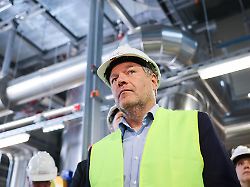“Achievement of the climate protection goals”
Habeck: Expansion of heating networks is progressing
06/18/2023, 11:16 am
Around 70 percent of the district heating energy currently comes from fossil fuels, primarily coal and gas. That should change. By 2045, this heat should be greenhouse gas neutral. Germany is on the right track, says Economics Minister Habeck.
Federal Economics and Climate Protection Minister Robert Habeck sees the expansion of climate-friendly heating networks in Germany on the right track. “The expansion and conversion of green heating networks is progressing,” said the Green politician. This is shown by the good response to the federal funding for efficient heating networks. “Together with municipal heat planning, the funding contributes to the heat transition and the fulfillment of climate protection goals.”
The federal funding for efficient heating networks promotes the construction of new heating networks with a high proportion of renewable energies and the decarbonization of existing networks. According to the ministry, according to the current budget planning, around 3 billion euros are currently available for this until 2027. According to the current status, around 200 million euros in funding from the climate and transformation fund – a special fund of the federal government – have been approved for the decarbonisation of the heating networks since the start in mid-September 2022. More than 400 applications were approved. The competent Federal Office for Economics and Export Control has received 753 applications so far.
Heating infrastructure should become climate-neutral
Heating networks should be a key to the heat transition, especially in cities, i.e. the phasing out of fossil energies such as oil and gas. Municipal heating planning is to play a special role. This is also the central change in the changes to the heating law agreed by the traffic light coalition. If there is no municipal heating plan, the heating law should not yet apply with the switch to more climate-friendly heating systems.
A municipal heating plan is to be in place throughout Germany by 2028 at the latest. Federal states and municipalities should present concrete plans on how they want to convert their heating infrastructure to be climate-neutral. Then homeowners should be able to decide whether, if possible, they should be connected to a district heating network – or, for example, install a heat pump.
Around 70 percent of the district heating energy currently comes from climate-damaging fossil fuels, primarily coal and gas. District heating should be greenhouse gas-neutral by 2045. According to earlier information from the ministry, federal funding for efficient heating networks supports renewable heat generation, for example from geothermal energy, solar thermal energy and the use of large heat pumps. In cities in particular, connection to increasingly climate-neutral district heating is the decisive way to get away from oil and gas heating, it said.
